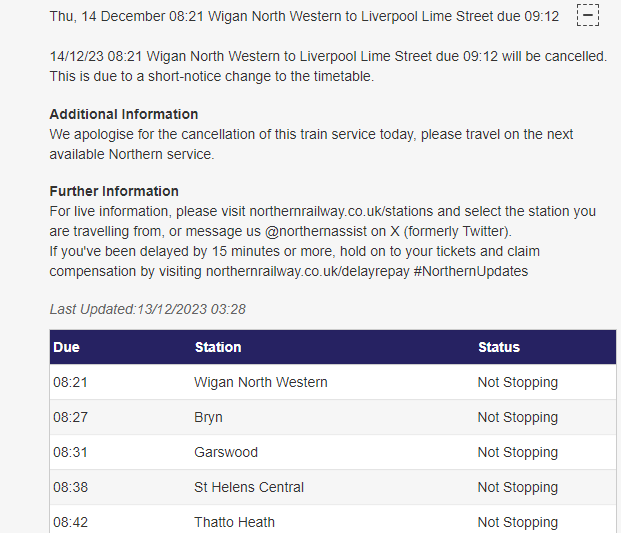What is ‘A Short Notice Change to the Timetable’?
-
Published
If you’ve taken a train and suffered a cancellation, then you might have seen ‘a short notice change to the timetable’ being given as a reason. This doesn’t explain the issue very well, though. So, what does this reason mean and how does it affect your journey? Let’s take a look.
What is a Short Notice Change to the Timetable?
In a nutshell, a short-notice change to the timetable means that the operator knew that they wouldn’t be able to operate the train. This is usually because of a shortage of trains or a shortage of staff. This normally happens the night before the service is due to run. For it to count as a ‘short-notice’ change to the timetable, this has to happen before 22:00 the night before. The industry term for this behaviour is ‘P-coding’. Here is an example:

This differs from a normal cancellation. This is because the train doesn’t appear on the timetable anymore! As a result, the cancellation figures for the day don’t show it. So, operators are able to ‘delete’ trains that they know that they would have to cancel anyway.
Is this fair? Not really, no. Operators can use this to avoid paying compensation and these cancellations don’t appear in the ‘official’ reliability figures.
Will the cancellation reason always be the same?
Not every operator will use ‘short notice change to the timetable’ as a P-coded cancellation reason. Some will use the ‘actual’ reason, such as a lack of train crew or available trains.
How does this impact my journey?
You can still travel on the train before or after (operated by the same company). If there are no more services available, then the operator will need to arrange for ticket acceptance or provide replacement transport. You still have the right to complete your journey, as per the National Rail Conditions of Travel (Section 28.2):
Where disruption prevents you from completing the journey for which your Ticket is valid and is being used, any Train Company will, where it reasonably can, provide you with alternative means of travel to your destination, or if necessary, provide overnight accommodation for you.
How does it affect my ability to claim compensation?
This is the stickler. The National Rail Conditions of Travel were altered in 2022. They now state, under section 27.4, that compensation is based upon the ‘timetable of the day’. Here’s the definition that they give:
(Timetable of the day) means the schedule of services, including rail replacement services, applicable on the day you travel or plan to travel (different to May or December timetable). These changes will be published no later than 22:00 the day before travel and available at www.nationalrail.co.uk
So, if your train was cancelled before 22:00 the day before travel, some operators will argue that they no longer pay out on these Delay Repay claims. However, we’d still recommend putting in a claim if you suffered a delay. You can still apply for a refund in the usual way if you no longer wish to travel at all.
Are these cancellations shown in reliability figures?
So, have you ever suspected that some train companies are claiming to be more reliable than they actually are? You aren’t being cynical or imagining things. A ‘short notice change to the timetable’ simply doesn’t count as a cancellation. Rather, the train has been removed from the timetable entirely. Reliability figures from the operators are based on the planned timetable at 22:00 the night before travel.
The Office of Rail and Road has started to publish two sets of cancellation figures. One is the ‘published’ figure, and the other is the ‘adjusted’ figure. In the case of the latter, they’ve added in the P-coded cancellations. So, how drastically do these figures differ?
Well, between July and September 2023, Grand Central ‘officially’ cancelled 6.7% of trains. Meanwhile, the real figure was 19.7%. TransPennine Express said that they cancelled 5%, but the actual amount was 13.2%.
You can read more on their report here.
Is there anything else I should know?
Looking to know more about how reliable the railway is? We regularly update our page on the least reliable operator with the latest figures from the ORR. If you have any questions about the journey that you’ve booked with Railsmartr, feel free to contact us.
Ready to book a trip? You’re in safe hands with Railsmartr. We don’t charge any admin fees, so you’ll never need to pay more for changing your mind. If your ticket is refundable and you don’t want to travel, we’ll never deduct a fee. Meanwhile, you’ll only ever pay the difference if you want to amend an Advance ticket.
Of course, our site is chock-full of useful Expert Tips to help you travel smarter on your next trip.